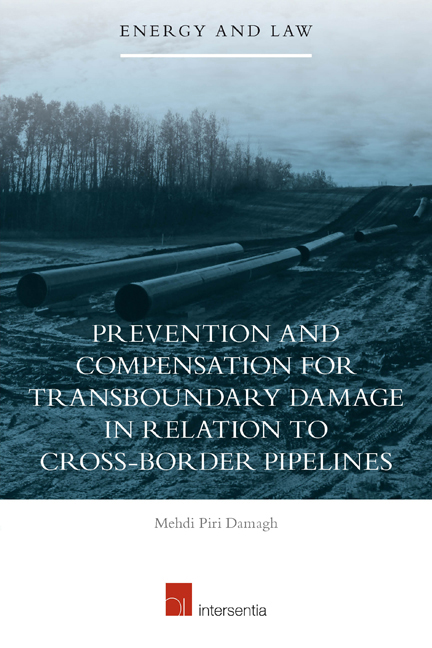Book contents
- Frontmatter
- Dedication
- Acknowledgements
- Contents
- Abbreviations
- List of Tables and Maps
- Chapter 1 Introduction
- PART I INTRODUCTORY ISSUES: PIPELINES, THE NATURE OF RISKS ASSOCIATED WITH PIPELINES AND THEIR REGULATORY REGIMES
- Introductory Note
- Chapter 2 General Features of Cross-border Oil and Gas Pipelines – The Ground Rules
- Chapter 3 Risks and Harm Relared to Cross-border Pipelines
- Chapter 4 Cross-border Pipelines: The International Legal Regime
- PART II PREVENTION OF CROSS-BORDER PIPELINE ACCIDENTS – MEANS AND SOURCES
- PART III STATE RESPONSIBILITY FOR TRANS-BOUNDARY DAMAGE CAUSED BY PIPELINES
- Summary
- Bibliography
- Valorisation Addendum
- Curriculum Vitae
Chapter 2 - General Features of Cross-border Oil and Gas Pipelines – The Ground Rules
from PART I - INTRODUCTORY ISSUES: PIPELINES, THE NATURE OF RISKS ASSOCIATED WITH PIPELINES AND THEIR REGULATORY REGIMES
Published online by Cambridge University Press: 13 December 2017
- Frontmatter
- Dedication
- Acknowledgements
- Contents
- Abbreviations
- List of Tables and Maps
- Chapter 1 Introduction
- PART I INTRODUCTORY ISSUES: PIPELINES, THE NATURE OF RISKS ASSOCIATED WITH PIPELINES AND THEIR REGULATORY REGIMES
- Introductory Note
- Chapter 2 General Features of Cross-border Oil and Gas Pipelines – The Ground Rules
- Chapter 3 Risks and Harm Relared to Cross-border Pipelines
- Chapter 4 Cross-border Pipelines: The International Legal Regime
- PART II PREVENTION OF CROSS-BORDER PIPELINE ACCIDENTS – MEANS AND SOURCES
- PART III STATE RESPONSIBILITY FOR TRANS-BOUNDARY DAMAGE CAUSED BY PIPELINES
- Summary
- Bibliography
- Valorisation Addendum
- Curriculum Vitae
Summary
INTRODUCTION
Cross-border oil and gas pipelines are categorized as complex projects. In order to scrutinize the legal framework governing the damage of these pipelines, it is necessary to describe the general characteristics of such pipelines. This Chapter illustrates general aspects of cross-border oil and gas pipelines from technical, economical, geopolitical and stakeholders’ perspectives. Characterizing general features of cross-border pipelines will illustrate the physical nature of oil and gas pipelines. Further, there is a close functional connection between general features of cross-border pipelines, associated risks and preventive measures. Hence, the approach of this Chapter is to determine the ground rules concerning pipelines. It should be noted that the technical aspects of pipelines are not directly legal issues, but they play a fundamental role in identifying and assessing the harm related to pipelines.
The increasing rate of energy consumption in recent decades demonstrates how supplying energy plays an important role in various industries in the world. Moreover, it is necessary to consider the status of natural gas and crude oil in the world market because of their high price and the importance of security of constant supply. In addition, cross-border pipelines are categorized as projects requiring high investment at the construction stage with a low maintenance price. Therefore, uninterrupted operation of pipelines ensures their profitability. This issue underlines the importance of examining the economics of cross-border pipelines.
From a geopolitical perspective, the long distances between the main sources of the hydrocarbons and the major markets for them to create a need for the safe transportation of energy. However, states involved seek to maximize their own benefits and often use cross-border pipelines as a strategic weapon. This matter greatly affects legal arrangements governing the pipelines. Even the routes of cross-border pipelines have sometimes been chosen based on political interests rather than economic or environmental interests. Further, some commentators claim that many oil and gas pipeline accidents have been caused intentionally to disrupt the constant supply of energy and thereby threatening the future prospects of such projects. When a pipeline crosses the borders of another state, the transit state should be agreed at the time of the construction of that pipeline.
- Type
- Chapter
- Information
- Prevention and Compensation for Transboundary Damage in Relation to Cross-border Oil and Gas Pipelines , pp. 25 - 58Publisher: IntersentiaPrint publication year: 2015



